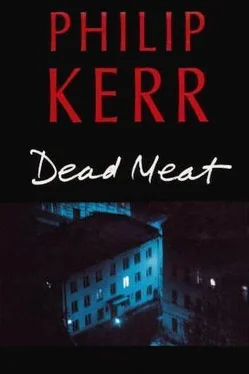‘We’re keeping an eye on all the tourist hotels,’ said Grushko. ‘If he is running a new herd of cows then that’s where we’ll find him.’
‘Yes, well, make it soon, Yevgeni. Since you mentioned Sverdlovsk, then remember what happened there. It was a war.’
‘Yes, sir.’
‘What puzzles me is how he got out of the zone so early?’
‘According to my contact in the GUITI,’ I said, ‘it was someone in the Department who fixed it.’
‘Does he have any idea who?’
I shrugged and shook my head.
‘What are they up to?’ he muttered. ‘Let’s just hope you’re right about this Chechen, Yevgeni. You know, without him, you’ve really got nothing. Nothing.’
I could see Grushko didn’t much like to be ridden by Kornilov in front of us, but he just bit his lip and nodded sullenly. That was why Nikolai, Sasha, Andrei or any of his men would take it from Grushko: because they knew he had to take it from Kornilov.
‘By the way,’ said Kornilov, after the funeral procession had disappeared from view. ‘That icon they were carrying. Who was it?’
Grushko smiled thinly.
George, sir. Who else for Georgians?’
There has been a police prison on the site of the Big House since the time of Catherine the Great. After the assassination of Alexander II the site at Number six Liteiny Prospekt became the headquarters of the newly created political police, the Okhrana. Following the abandonment of Leningrad as the country’s capital, the Leningrad NKVD plotted the murder of Stalin’s rival Kirov from the old building at Number six. They then used his death as a pretext for purging the local party and, for that matter, the local NKVD as well. Stalin’s most notorious henchman, a Georgian named Laventri Beria, had spent some considerable time working in the newly built Big House. His desk and typewriter were still in use. It was small wonder people joked that from the top of the building you could see Solovki, the most notorious of all Stalin’s White Sea Canal labour camps, where hundreds of thousands of people had perished; and it was only fitting that the Department, even in its post-Party truncated form as the Russian Security Service, should occupy the top two floors.
Grushko walked along the corridor and reflected that even now, after the demise of the Party, things were still more comfortable for the KGB than for their poor cousins downstairs. There were fresh towels, soap and lavatory paper in the washrooms. The floors were covered with thick blue carpets instead of dirty brown linoleum, while in every office were computers, fax machines and photocopiers.
He entered one office where a woman in her forties with neatly cut auburn hair and wearing a smart blue two-piece suit was taking books down from her shelves and packing them into cardboard boxes. Vera Andreyeva seemed more like someone who read the news on television than a major in the KGB.
‘What’s this?’ said Grushko. ‘Are you moving into better offices?’
Andreyeva smiled at Grushko’s little irony.
‘As a matter of fact I am,’ she said. ‘I’m leaving the Department, Yevgeni. What’s left of it, anyway.’
‘Leaving? Surely they’re not getting rid of you as well, Vera Fyodorovna? I thought that the Department was going to use its best resources to fight organised crime and economic corruption.’
‘Oh, they are,’ she said. ‘But then so is the army. And the navy. And for all I know the air force as well. All of us looking for a new role in life. And stepping on your toes.’ She shook her head. ‘Wasn’t it Chekhov who said that when a lot of remedies are suggested for a disease, then it can’t be cured?’
‘I never liked Chekhov much,’ said Grushko. He picked up a book from her desk. ‘ Reforming the Soviet Economy: Equality versus Efficiency .’ He inspected another. ‘ The Nature and Logic of Capitalism . You are on the move, Vera. What will you do?’
‘I’ve been offered a job with a Russo-American joint-venture company,’ she said happily. ‘They’re planning to open a chain of real hamburger restaurants throughout Russia. I’m in charge of recruitment.’
‘An ex-KGB major in charge of recruitment? It figures.’
Vera turned towards Grushko and gave him a look, as if she were measuring him up.
‘I wonder,’ she said thoughtfully.
‘What?’ he said.
‘You, Yevgeni? How would you fancy handling security for us? We could use a man like you. The price of meat being what it is, security will be one of our most important considerations.’
‘Oh, I don’t doubt it,’ smiled Grushko. ‘But you’re serious, aren’t you?’
‘Why not? Just think of the pay. You know what the Department were going to retire me on? Seven hundred and fifty roubles a month. You know how much I earn with the joint-venture?’
‘Please don’t tell me,’ said Grushko.
‘Thirty thousand roubles a month. That’s forty times as much.’
Grushko smiled weakly. ‘The same as a miner,’ he joked, knowing that the joke was on him: since the miners had settled their strike, 30,000 roubles was indeed what one of them earned in a month.
‘Someone with your background could very probably pick up the same.’
‘What use would I have for that kind of money?’
‘Knowing you, Yevgeni Ivanovich, none at all. But your wife — now she’s a different story. I don’t doubt she’d find plenty to spend it on. Even in the state shops.’
‘“The riddle of the money fetish is therefore the riddle of the commodity fetish now become visible and dazzling to our eyes.”’
Vera looked taken aback.
‘I never thought I’d live to hear it,’ she said. ‘Of all the people to quote Marx...’
‘I couldn’t remember any Chekhov,’ said Grushko. ‘Look, Vera, thanks for the offer but I’m not here to talk about myself.’
‘You want to know about your Georgians, don’t you? Well, I’ve had a word with our friends in the seventh CD and the surveillance is in place. So you can relax.’
‘And the information about Mikhail Milyukin?’
Vera Andreyeva lifted another cardboard box on to the desk.
‘Tapes, transcripts, files, everything, like you asked.’
Grushko peered curiously into the box.
‘But why was his phone tapped at all?’ he said. ‘I mean, why now?’
She shrugged. ‘Oh, I dare say it always had been and nobody thought to have it removed. Things are a bit like that these days: we’re a plane on automatic pilot, only the captain’s already baled out.’ She lifted an armful of books and dropped them into another box. ‘Well, now it’s my turn.’
‘And does that mean you can talk freely?’ Grushko’s tone was cautious.
Andreyeva lit a cigarette and sat on the edge of her desk.
Try me.’
‘Your colleagues...’
‘Correction: my former colleagues...’
‘Would you say that many of them are anti-Semitic?’
‘The Department has its fair share of prejudice, Yevgeni. Just like everywhere else.’
‘All right then, let me ask you this: is there anyone here who might have had it in for Mikhail Milyukin?’
‘Enough to kill him? No, I don’t think so.’
‘Enough to scare and harass him maybe?’
She thought carefully for a minute.
‘I couldn’t ever repeat this,’ said Vera. ‘At least, not before an investigator.’
Grushko shook his head. ‘Between you and me then,’ he said.
‘All right,’ she said. ‘I believe there was someone in the second CD who tried to persuade Milyukin to spy on a couple of English journalists. I think he probably tried to squeeze him a little.’ She shrugged. ‘Well, that’s the way they work, of course. But not what you’re suggesting. Anyway, they’ve left now. The officer and the two journalists.’
Читать дальше












